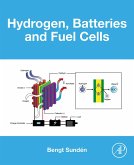Until now, there has been little written about this important technology. This book lays the groundwork for fuel cell engineers, technicians and students. It covers the fundamental aspects of fuel cell design, electrochemistry of the technology, heat and mass transport, system design and applications to bring this technology to professionals at all levels.
* Comprehensive guide for engineers, researchers and policymakers
* Covers theory and practice of PEM fuel cells
* Contains hundreds of original illustrations and real-life engineering examples
Dieser Download kann aus rechtlichen Gründen nur mit Rechnungsadresse in A, B, BG, CY, CZ, D, DK, EW, E, FIN, F, GR, HR, H, IRL, I, LT, L, LR, M, NL, PL, P, R, S, SLO, SK ausgeliefert werden.









